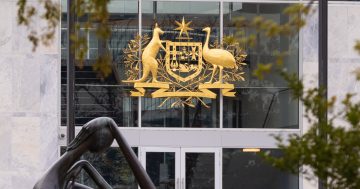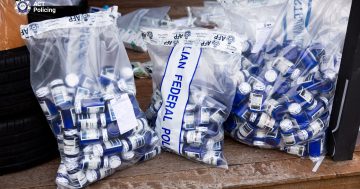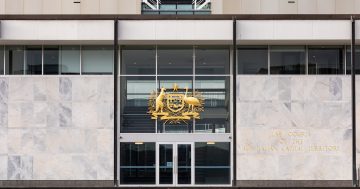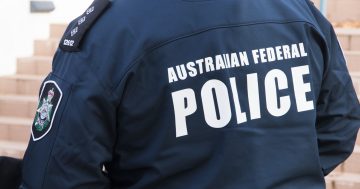
The AFP denied data breaches needed to be the subject of an ACT Integrity Commission investigation if the Commission had the power to investigate the organisation. Photo: File.
A prominent Canberra criminal lawyer says the admissibility of evidence in criminal investigations is impacted by the lack of a disciplinary body for ACT Policing.
Chairperson of the ACT Law Society’s Criminal Law Committee and Kamy Saeedi Law partner, Michael Kukulies-Smith, made the comments amid renewed calls for ACT Policing to be covered by the Territory’s Integrity Commission.
The calls follow revelations that no officer had been disciplined despite thousands of data breaches that potentially jeopardised criminal investigations.
The lack of an external integrity body may be impacting criminal proceedings in the ACT due to the court’s requirement to consider disciplinary action an officer could face when presenting legally questionable evidence.
Evidence gathered is not admissible if obtained illegally or “in consequence of an impropriety or of a contravention of an Australian law”.
Courts in the ACT tend to lean towards dismissing or excluding evidence under this provision due to the lack of external discipline officers would face if it was admitted, Mr Kukulies-Smith said.
“The rationale behind that is if a person is going to be disciplined then the court might be more minded to let the evidence in because disciplining can happen outside the court,” he said.
“I would suggest part of that is the nature of the policing arrangement we have here … because those disciplinary proceedings are absent in ACT scenarios.”

Canberra criminal lawyer Michael Kukulies-Smith said the data breach could impact evidence used in criminal proceedings. Photo: Supplied.
In documents released to Region Media under freedom of information laws, the AFP said no officer would be disciplined as “the AFP remains a learning organisation and our officers will make mistakes”.
“With additional training and further oversight, this should prevent breaches like this occurring in the future.
“However, if this keeps occurring, it would be considered a significant breach by an officer and would then be assessed by AFP’s Professional Standards area.”
Questions about the conduct and accountability of officers that arose were not entertained by ACT Policing which opted to take an “education-based approach to enhancing compliance” and culture within its ranks.
It dismissed the idea that the ACT Integrity Commission should examine the breaches if ACT Policing came under the Commission’s scope.
The ACT does not have its own police force; instead, it pays the Australian Federal Police (AFP) around $165 million a year to provide policing services to the Territory through ACT Policing.
ACT Policing sits under the AFP umbrella and cannot be investigated by the ACT Integrity Commission as it’s a federal body.
Mr Kukulies-Smith said it is a concern that the ACT Government did not have the same degree of control over serving police officers in the Territory that other states had.
NSW Police are subject to the Law Enforcement Conduct Commission, a permanent independent investigative commission that provides oversight of police and the NSW Crime Commission.
“The AFP, explicitly under our policing agreement, is not subject to those [enforcement bodies],” Mr Kukulies-Smith said.
Last year an ACT Legislative Assembly recommended that the Territory trial its own independent police force to increase oversight and accountability before renewing its agreement with the AFP. The current five-year agreement is set to expire this year.
The report said, “The Minister for Policing has little day-to-day sight of the operations of ACT Policing, and this makes ministerial responsibility in this context complex [and] possibly near impossible to discharge fully”.
Documents sought under FOI also revealed that ACT Attorney-General Shane Rattenbury did not receive a ministerial briefing about potential legal exposure or concerns about ACT criminal prosecutions that could be reviewed or overturned due to breaches by ACT Policing.
The ACT Justice and Community Safety Directorate confirmed that there were no briefing materials about legal repercussions as of 18 May 2021, three weeks after the public release of the Ombudsman’s report.
Oversight over the AFP would require changes to federal legislation.

Dr Andrew Leigh has called for more Territory rights. Photo: Region Media.
Federal Labor member for the north Canberra seat of Fenner, Dr Andrew Leigh, told Region Media that it was time for the federal parliament to give the ACT more autonomy concerning self-government.
“Whether it is deciding for ourselves on euthanasia or having the mandate to make sure everyone working for the public in the ACT meets the standards the community expects, it is time the Federal Government recognised we are perfectly capable of governing ourselves,” he said.
Dr Leigh introduced legislation in February 2020 that would have reversed laws that exempted ACT police from the ACT Integrity Commission.
“This ensures that policing services provided in the ACT have the proper oversight that everybody in the Territory would expect to exist,” he told federal parliament when he spoke on the bill.
Both the Northern Territory and Tasmania, comparative jurisdictions in terms of size and structure, have their own independent police forces.





















